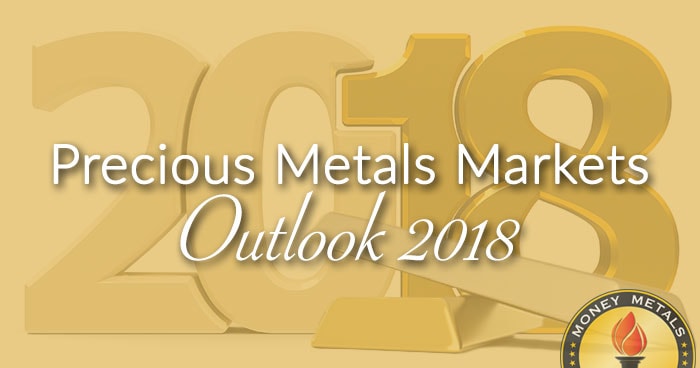The first trading days of 2018 are confirming signs of renewed investor interest in the precious metals sector after a long period of malaise.

Gold and silver markets entered the year with some stealth momentum after quietly posting gains late in 2017. Gold finished the year above $1,300/oz. – its best yearly close since 2012.
Over the past five years, the yellow metal has been basing out in a range between $1,050 and $1,400. A push above $1,400 later this year would therefore be significant.
It would get momentum traders and mainstream financial reporters to take notice.
The alternative investing world was enthralled by Bitcoin in 2017. While we don’t expect a Bitcoin-like mania to take hold in precious metals in 2018, we do expect gold and silver markets to make some noise.
Stimulus to Push Up Commodity Prices Again
Even as the Federal Reserve vows to continue raising its benchmark interest rate and “normalizing” its balance sheet, a flood of new fiat stimulus is set to hit the economy. The recently passed tax cuts will cause hundreds of billions – perhaps eventually trillions – of dollars to be repatriated back to the United States.
For years, many corporations have hoarded business assets overseas in more favorable tax environments. The U.S. had one of the world’s least competitive corporate tax structures. With the corporate rate dropping to 21% in 2018, the U.S. suddenly becomes a much more attractive place in which to set up shop.
The good news is that dollars are coming back home and getting reinvested in capital projects, wage increases, and new hiring. The potentially bad side effect is that higher inflation increasingly shows up in consumer prices.
An inflation uptick would likely cause long-term interest rates to rise, which would dig the government’s $20.6 trillion debt hole deeper. (Federal deficits are expected to grow by more than $1 trillion under the GOP’s latest budget, which fails to pair tax cuts with spending cuts.)
The flood of deficit-financed stimulus sets the economy up for a short-lived spurt of gains… followed by longer-duration debt and inflation pains. For now, investors are still enjoying gains, as reflected by the ongoing strength of the stock market. But inflationary pressures are already building in raw materials markets.
Mining Output Continues to Decline
The supply and demand fundamentals for precious metals improved in 2018. Low gold and silver prices over the past few years have hurt the mining industry. Although it has continued to operate existing mines – sometimes even at losses – it has slashed exploration and development of new projects. That will mean years of stagnating or even declining output ahead.

Metals Focus projects mining output of gold in 2018 will be 3,239 tonnes, a slight decrease from 2017. Analysts expect a more significant drop could occur in 2019.
A similar pattern is expected to play out in silver, though it’s more difficult to forecast since few primary silver miners exist (most silver comes as a byproduct of base metals mining operations). Demand for silver is also more variable, with investment demand being the biggest wild card.
Commodity markets analysts at TD Securities believe silver may be the metal to own in 2018. According to TD’s 2018 Global Outlook, silver prices should hit $20/oz this year (after finishing 2017 just under $17).
Palladium Is on a Tear
Turning to the platinum group metals, platinum is widely expected to go into a supply deficit this year or next after finishing 2017 at a small surplus. Its sister metal palladium experienced an annual supply deficit of 680,000 ounces last year and growing concerns of shortages, helping drive its big price gains.
Even with palladium prices now touching all-time highs, available supply is still on the wane. HSBC forecasts an expanding palladium deficit in 2018 to more than 1 million ounces.
The growing shortage figures to continue pressuring palladium prices upward. It’s also bullish for platinum. That’s because automakers and other industrial users of palladium now have an incentive to switch to less expensive platinum where possible.
Large-scale substitutions don’t take place immediately. But in 2018, demand drivers could finally start shifting back in favor of platinum.
Platinum, silver, and gold investors who have sat patiently in their positions waiting for them to break through to the upside will be rewarded. It’s a question of whether that happens early in 2018 with the economic stimulus, late in 2018 as a reaction to potential tremors in bond and stock markets, or in 2019 when supply destruction starts to kick in more strongly.
Only “Mr. Market” knows for sure.
While you can still buy gold under $1,400 and silver under $20, they remain (for now) compelling values. Silver looks especially compelling given its cheapness relative to gold and virtually every asset on the planet.

About the Author:
Stefan Gleason is CEO of Money Metals Exchange, the company recently named "Best Overall Online Precious Metals Dealer" by Investopedia. A graduate of the University of Florida, Gleason is a seasoned business leader, investor, political strategist, and grassroots activist. Gleason has frequently appeared on national television networks such as CNN, FoxNews, and CNBC and in hundreds of publications such as the Wall Street Journal, TheStreet, and Seeking Alpha.





